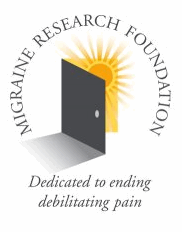Cathy Glaser, President of the Migraine Research Foundation, was kind enough to write this note to you all. Feel free to share it with family and friends. Thank you so much for your support of migraine research!
How Do We End the Pain of Migraine?
 |
Recently, I attended a lecture given by a prominent neurologist on new advances in migraine research. Speaking to an overflow crowd, the doctor was bombarded with questions from the audience – all sufferers or family and friends of sufferers – about what can be done to end the debilitating pain of migraine. The audience’s hunger for information was reflective of a frustrating fact of life for sufferers. While much of the conversation about migraine centers on symptoms and treatment options, there is insufficient knowledge about the underlying causes of migraine. Without this, how are we to end the suffering of the 36 million Americans afflicted by it? The reason? Migraine is one of our nation’s most overlooked, misunderstood, and under-funded illnesses. Though migraine affects 1 in 10 – including children and a disproportionate number of women – and ranks in the top 20 of the world’s most disabling illnesses, funding for research into its causes is shockingly low.
Part of the explanation is that because migraine has no outward physical expression and is not usually life-threatening, many people don’t realize how serious and debilitating it can be. But the consequences can be extremely severe. In addition to living with the pain itself, many sufferers miss work, school, and social activities, and sometimes must sacrifice their careers and livelihoods. Every 10 seconds someone goes to an emergency room with headache or migraine. And 14 million Americans live with chronic migraine, a condition much more difficult to treat than the more common episodic migraine. Almost everyone, it seems, either suffers from migraine or knows someone who does.
Sharing experiences about triggers and treatments is one way to provide support to sufferers, but the only way that we will ever make real progress against this scourge is through funding migraine research. We must support scientists so that they can continue to investigate the links between hormones and migraine, the causes of pediatric migraine, the effects of medication overuse, the reasons for the transformation of episodic to chronic migraine, the role of genetics, and many other inquiries. Migraine research has lacked for funding and support for far too long. Only by helping research scientists discover migraine’s causes will we eventually find effective treatments that will enable sufferers to live healthy, happy, and productive lives. But effective treatments shouldn’t be our only goal. We must work to find ways to prevent migraine, and even to cure it.
Cathy Glaser, President
Migraine Research Foundation
Find out more about the Migraine Research Foundation here.




